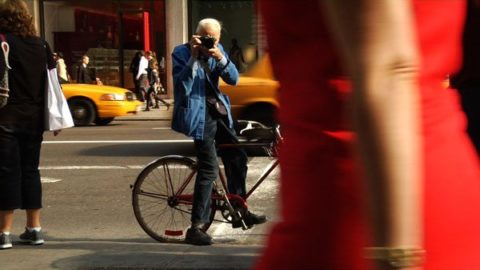All about Bill: Our Q&A with the director of Bill Cunningham New York


One of fashion’s most celebrated yet understated stars, Bill Cunningham, is finally getting his moment in the spotlight…. though he’s already shying back out of it. Despite photographing some of the most memorable street style images in over 4 decades for the New York Times (many times from a bicycle that he folds into a closet outside his apartment in Carnegie Hall), the 80+-year-old photographer sees himself as nothing more than a mere fashion enthusiast. Proving nothing but the contrary, director Richard Press turned his lens on the man for the new film, Bill Cunningham New York. Finally opening in Toronto and Vancouver this Friday April 22nd after receiving weeks of rave reviews from New York and LA, the film is so overwhelmingly heartwarming that it’ll have you crying tears of fashion joy. We had the change to speak with Press and quiz him all about Bill and his legendary impact on fashion.
This is your first feature film, what made you want to focus on Bill, specifically?
The film took 10 years to make: eight years to convince Bill to let us make the movie, and two years to actually film it. Really, for me, I’ve always been familiar with his body of work in New York because I knew his column, but really for me the who Bill is as a person. You know, how he’s chosen to live his life, his ethics, his morals, the joy he gets from his work, his religious obsession with his work, so that’s what I was really trying to capture. He celebrates self-expression, and that really was a big part of the feeling of the movie that I wanted, was these great characters.
What does he think about the movie? Has he seen it?
He hasn’t seen it! We tried to get him to see it, he knows what’s in it, he’s given us his blessing, but he just says kids, you made a movie, have fun, but I’m too busy, he just has no interest.
Bill seems to be one of the last of a dying breed in so many different ways, in wanting to do something and just going for it, rather than having to part of an establishment or system, and also in not being influenced by all of the perks of the industry.
He’s sort of the last bohemian in a certain way, he’s doing it with such purity and purpose, and I almost wonder if it’s a generational thing. I think he represents a certain way that the culture was and that is sort of dying out because everyone now wants to be rich and famous, and get as much attention paid to them as possible. Here’s this guy who’s exactly the opposite, who wants no attention paid, he doesn’t care about fame, he doesn’t care about money, he just cares about the pleasure of doing what he does, and for the most pure reason.
I love that this movie made me remember when I first started to get into fashion, and I was just so crazy for everything.
Exactly. I mean really, it just brings you back to your innocence in a way.
Another thing I loved about Bill and about Editta Sherman (Bill’s 98-year-old photographer neighbor) is that they were just such characters. She just reminded me of the last flag-waver of the Edie Beales of the world.
She raised five kids in that studio with no kitchen and no bathroom, and at 98, she’s still taking pictures and she still wants to get a gallery show, she’s just this life force, of pure artist, she lives the artist life in the purest sense.
What Harold Koda (the Costume Institute’s head curator) and Anna Wintour say about Bill is interesting, that he operates outside the system and therefore picks up on all sorts of different style cues. He’s just photographing what he loves. Why do you think it took so long for that kind of outsider view to become the mainstream?
It really has to do with just the Internet and technology and everything has become more democratized, and so it’s just access. There are more ways to get your message out and people are really about how they present themselves, so I think that’s why there’s really a big interest in street fashion. The culture right now is really about how do we present ourselves to the world, and I think it’s just in keeping up with the whole Facebook-online mentality of that.
What interested you the most about Bill while working on the film?
I knew he was dedicated to his work, but I didn’t know to what extent he was so passionate about what he does. I joke that Bill had taken a vow of fashion, and he’s dedicated to it, and there’s almost this religious quality to it that’s kind of monk-ish, so I didn’t realize that he really works all the time, almost to the exclusion of everything else.
I think the funniest part of the movie was when he was taking pictures of those young girls, who told him to f-off. When you were filming him, how many people do you think know who he is? Is it just the fashion people and the people who read the New York Times?
He really has been invisible all these years, when I was filming him on the street, New York is just so focus when they’re on the street, and nobody noticed him photographing them, and nobody noticed me filming him, and it was amazing. People know him, and he knows so many people in New York, so occasionally somebody would come up to him and just talk, an acquaintance or just a friend, but basically, people that he’s photographing have no idea they’re being photographed.







